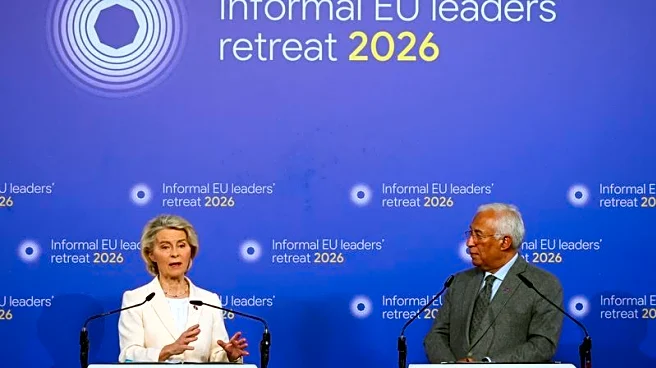What's Happening?
The Senate Democrats have blocked an effort to advance a year-long appropriations bill to fund the Pentagon, stalling Republican leaders' alternative approach to restart some funding during the ongoing government shutdown. The vote, which required 60
votes to advance, fell short at 50 to 44, with only three Democrats voting in favor. Senate Majority Leader John Thune criticized Democrats for opposing the bill, which he argued would pay the troops. Senate Minority Leader Chuck Schumer stated that Democrats would not support the Defense bill without accompanying legislation addressing health care, housing, and safety. The shutdown has persisted with no movement despite repeated votes on short-term funding measures.
Why It's Important?
The failure to advance the Pentagon funding bill highlights the deep partisan divide in Congress, particularly during a government shutdown. The inability to secure funding for the Defense Department could have significant implications for military operations and personnel, potentially affecting troop pay and readiness. The Democrats' insistence on including broader social issues in the funding discussions underscores the ongoing debate over government priorities and spending. This impasse may lead to increased pressure on lawmakers to negotiate a comprehensive funding package that addresses both defense and domestic concerns.
What's Next?
As the government shutdown continues, the Senate may face increased pressure to find a resolution that satisfies both parties. The Republicans may attempt to negotiate with Democrats to include additional appropriations for health, labor, and education in the funding package. Meanwhile, President Trump has directed the Pentagon to use available funds to avoid service members missing paychecks, but this is seen as a temporary fix. The ongoing stalemate could lead to further political maneuvering and negotiations as both parties seek to address their priorities while reopening the government.
Beyond the Headlines
The current situation reflects broader challenges in the U.S. legislative process, where partisan politics often hinder timely and effective governance. The reliance on omnibus bills and last-minute negotiations has become a norm, raising questions about the efficiency and transparency of the appropriations process. The debate over defense funding versus domestic priorities also highlights differing views on national security and social welfare, which could influence future policy decisions and electoral outcomes.

















